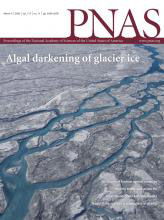Mount Allison microbiologist among international research team studying the effects of climate change on the Arctic through algae blooms
Research collaboration around Greenland Ice Sheet featured on the cover of PNAS’s March 17 Academic Journal
New research around the effects of climate change on the Greenland Ice Sheet was the cover story of the esteemed academic journal, Proceedings of the National Academy of Sciences of the United States of America  (PNAS) last month. The international research collaboration includes the work of Dr. Douglas Campbell, Mount Allison Biology Professor and Canada Research Chair in Phytoplankton Ecophysiology.
(PNAS) last month. The international research collaboration includes the work of Dr. Douglas Campbell, Mount Allison Biology Professor and Canada Research Chair in Phytoplankton Ecophysiology.
As part of the collaboration, samples from the ice sheet were analyzed in Campbell’s lab this past summer by visiting researcher Dr. Chris Williamson from the University of Bristol in the United Kingdom. The team is looking specifically at the activity of ice algae on the sheet. When warmed, the algae bloom and darken, making them visible on the ice during the summer months.
“The darkening pigmentation acts like a type of sunscreen for the algae, but also warms the temperature on the ice, which leads to melting,” explains Campbell.
Work was completed in Campbell’s lab using specialized equipment to help monitor algae activity this summer enabled the team learn more about this process and if this activity is contributing to glacier melting rates. Williamson spent a week in Campbell’s lab analyzing these ice samples in August 2019, his third trip to campus in the past two years.
 “These kinds of research partnerships are important, especially around global topics like climate change,” says Campbell. “We were pleased to assist with Dr. Williamson’s Black and Bloom project and see these results published by the PNAS.”
“These kinds of research partnerships are important, especially around global topics like climate change,” says Campbell. “We were pleased to assist with Dr. Williamson’s Black and Bloom project and see these results published by the PNAS.”
A microbiologist, Campbell has been a Canada Research Chair since 2001 and was recently renewed as a Tier 1 CRC, which is for seven years and comes with over $1.4-million in research funding over that time period. His research areas look at how different species of phytoplankton — microscopic marine plant organisms — respond to environmental change and includes many international collaborations like the one with Williamson.
The research abstract from the study, Algal darkening of Greenland Ice Sheet, can be found on the PNAS’s website (March 17, 2020 issue): https://www.pnas.org/content/117/11
Cover image: PNAS’s March 17 issue (Photo courtesy of Jenine McCutcheon)




